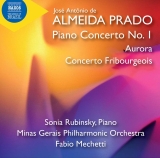Das erste Klavierkonzert des Brasilianers José Antonio de Almeida Prado (1943- 2010) hat wirklich was: über 25 Minuten lang entwickelt es sich mit perkussiv-archaischen, grandios aufrauschenden oder mysteriös-transzendierenden Klängen. Klanglich ungemein reich und in seiner Wirkung immer spannend ist es ein eloquentes, ebenso intelligent konstruiertes wie emotionales Stück, das man sofort wieder hören will, wenn man es zum ersten Mal entdeckt hat.
Almeida Prado studierte zunächst in seiner Heimatstadt Sao Paulo, später in Europa bei Olivier Messiaen und Nadia Boulanger in Paris sowie bei György Ligeti und Lukas Foss in Darmstadt. Seine ca. 400 Kompositionen umfassen Orchestermusik, Chorwerke, Klavier- und Kammermusik.
Nach dem faszinierenden Klavierkonzert kommt Aurora, eine Komposition aus dem Jahre 1975 für Klavier und Orchester. Aurora beginnt düster und geheimnisvoll, ist aber eigentlich im Großen und Ganzen ein eher bedrohliches Stück, das mit Prados Klavierzyklus Cartas Celestes verwandt und deutlich von Messiaen beeinflusst ist.
Das Concerto Fribourgeois aus dem Jahr 1985 wurde zum 300. Jahrestag der Geburt von Johann Sebastian Bach von einem Ehepaar der Schweizer Stadt in Auftrag gegeben. Mit Themen, die eine Hommage an Bach darstellen, ist das Werk aber ein gewichtiges, dicht orchestriertes Werk mit einem oft virtuosen Klavierpart. Der Komponist nannte die Komposition ‘post-brahmsisch’, sie ist aber bis auf kurze Passagen klanglich nicht so rund und lyrisch wie Brahms, eher kantig und von einer konstanten, nervösen Unruhe geprägt. Zusammengehalten wird das achtteilige Stück von gut 27 Minuten durch Prados lebhafte Phantasie und seine kohärente Schreibkunst. Wenn etwas hier an Brahms erinnert, dann das Finalkomponieren, die Art und Weise, ein Stück so aufzubauen, dass es immer dem Ende zustrebt.
Dass die drei hier erstmals eingespielten Werke zu einem nachhaltigen Hörerlebnis werden, ist auch den Interpreten zu verdanken, der brillanten brasilianischen Pianistin Sonia Rubinsky und dem brasilianischen Dirigenten Fabio Mecchetti, der mit seinem ebenso inspirierten wie kraftvollen Dirigat die Musik ungemein wirkungsvoll werden lässt.
























